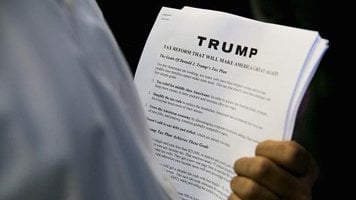Economy: Explained

Trump has long claimed that doing so will grow the U.S. economy by encouraging companies to remain stateside. That's because many companies – especially large corporations – often leave America to take advantage of lower corporate tax rates in other developed nations.
And with the failure of the Obamacare repeal, congressional GOPers will now be fighting even harder to make at least one of their main talking points a reality.
Trump's corporate tax cuts could be next.
Right now, the corporate tax rate in the United States is 35%. But President Trump wants to cut that figure dramatically – down to 15%. But cutting taxes means cutting government revenue, and Trump's corporate tax cut plan comes with a $3.7 trillion deficit for the U.S. government over 10 years. Someone or something will have to pay for that massive imbalance… Here's how Trump's tax reform could boost the U.S. economy… and at what cost.
How to Pay for Trump's Corporate Tax Cuts
If you make cuts somewhere, you'll have to account for those cuts somewhere else.Indeed, according to an Aug. 3 New York Times report, the Tax Foundation estimates that cutting the current 35% corporate tax rate down to 15% would add $3.7 trillion to the national deficit over ten years – assuming no additional economic growth and no spending cuts.
Look for the X: This mysterious "X" pattern predicts which stocks are going up – with 100% certainty. Some have gained as much as 225% in 15 days and 264% in less than a month. Learn more…
So where will President Trump make cuts?
Although many think that he'll make up the difference by cutting government programs, Trump's May 23 budget proposal doesn't differ significantly from President Obama's proposal from the year prior in terms of total money spent. It does spend that money very differently, but it doesn't actually cut government spending.
NYT suggests that he'll pay for the tax cuts by closing loopholes and cutting corporate subsidies elsewhere. For example, he could eliminate tax deductions on interest payments or raise capital gains taxes to put some of the burden on shareholders instead of on the corporations themselves.
But Trump hasn't explicitly said he would do any of that. Instead, the president seems to have put his faith in the pure economic growth that his corporate tax cuts would create…
How Trump's Corporate Tax Cuts Would Affect the Economy
Cutting the corporate tax rate to 15% will be "leveling the playing field" between U.S. businesses and their foreign competitors, Trump stated at a rally on Feb. 29, according to Time.For context, the U.S. has the highest corporate income tax rate of the 35 members of the Organization for Economic Cooperation and Development (OECD). The average of these countries is 25%, according to a 2013 Tax Foundation report. The country with the lowest corporate tax rate is Ireland, at 12.5%.
Corporate tax cuts would theoretically benefit the U.S. economy because they would incentivize American companies to stay and operate in the United States. Over time, their contributions to American job growth will generate national economic growth.
The Tax Foundation predicted in September 2016 that the plan would increase wages and even result in up to 2.2 million full-time equivalent jobs over ten years. In fact, the plan would increase the size of the economy by up to 8.2% over and beyond the growth that is predicted without any policy change.
But the $3.7 trillion question remains: Will this growth be enough to overcome the loss in government revenue?
We can't know for sure, but we do know this: A huge corporate tax cut would bring windfall profits back to companies no matter what.
And fast.
In fact, there's one stock in particular that we would want to be holding onto if Trump's tax reform was passed…
The Opportunity for Investors in Trump's Tax Reform Proposal
Money Morning Chief Investment Strategist Keith Fitz-Gerald explained how Apple Inc. (Nasdaq: AAPL) and its shareholders could benefit from a corporate tax cut in an Aug. 2 "Varney & Co." segment.Although Keith's not confident in Congress' ability to get anything done, he explains the upside of a tax cut for Apple in terms of buying back stock and increasing dividends for shareholders:
"People view dividends just as cash flow, but really what they are is an implied promise from management that they think they're going to be able to deliver what the investors expect. So if they brought [overseas funds] home and they did [increase dividends], that would be a huge vote of confidence for Apple and for Tim Cook in particular."
MORE: How Trump's Tax Reform Could Reshape The US Economy

No comments:
Post a Comment